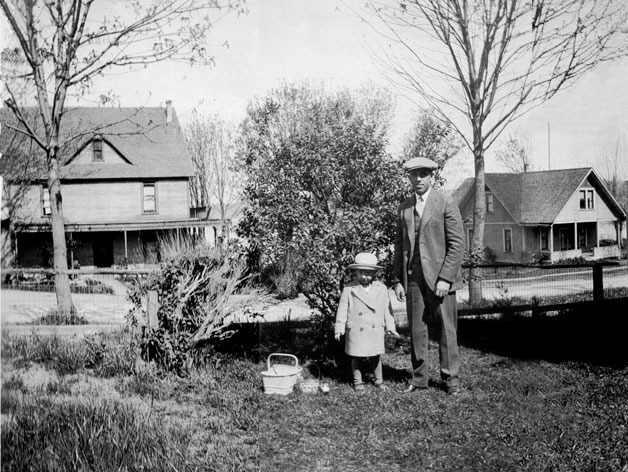About this series
Each Wednesday in May, the Record will publish a look back at Langley landmarks in a series researched by Linda Beeman, vice chairwoman of the Langley Historic Preservation Commission. The series is part of the National Trust for Historic Preservation’s seventh annual National Preservation Month.
Living history? Check out the McLeod House in downtown Langley.
“Maggie McLeod still haunts the halls,” said Fred Lundahl. “Sometimes jewelry that was in one place one day is in a different place another day.”
“I’m sure none of our customers could have done it,” he added.
Lundahl and his wife Sharon are the current owners of the historic structure built as a family home by Maggie’s parents, Sarah and Roderick McLeod, who followed the lead of family and fled west from the Nebraska droughts to end up in Langley in 1902.
Maggie later became a member of Langley’s historic all-women town council in 1920, and took over as mayor in 1922. She was mayor when the town purchased its first fire engine, a modified Ford with two chemical tanks.
After a series of transformations from home to grocery store to department store to the place where a current county commissioner honed her work ethic, the structure on First Street is now the home of the Lundahls’ Music for the Eyes textile and craft store, specializing in wares from Central Asia.
“The building has worked out fantastically,” Lundahl said. “If you don’t count the ghost.”
According to Linda Beeman of the Langley Historic Preservation Commission, Rod McLeod’s brother Hugh arrived in town ahead of him at the turn of the century and established a law office, while Sarah’s brother Ed Howard founded a general store and post office.
Rod and Ed Howard soon built the Howard Hotel on First Street, and members of the McLeod family shared responsibility for running it with their parents, who then built a house next door.
Besides helping to run the hotel, Sarah McLeod was Langley’s midwife.
In 1925, the McLeods sold the family home to Ernie Noble Sr., who arrived from Canada to run the Langley State Bank across the street. The Nobles lived there for many years, until Fern Livingston and her husband bought the building and turned it into a grocery store.
In 1949, the Livingstons sold the building to Irene and Cyrus Duncan, who operated it as the Langley Department Store. Fern Livingston continued to work at the store until 1983.
“The Duncans reputedly hid a treasure on the premises, but we haven’t found it yet,” Lundahl said, “We were hoping to use the treasure to pay off our mortgage.”
In 1956, Vincent and Matilda Jones purchased the business and the building, renaming it Jones’ Department Store.
The Joneses arrived from Lake City, where Vince was a businessman and school board member, and Matilda represented the 46th District in the state Legislature.
Langley elected Vince Jones mayor in 1958, and he held the post until his death in 1965.
According to Beeman, the Joneses expanded the building in 1962, adding floor space and a new front facade. Their daughter, Virginia Jones Price, purchased the business in 1965 and ran it with her mother until her mother’s death in 1982, when she was joined in the business by her daughter, Helen Price Johnson, currently an Island County Commissioner.
Price Johnson bought the business in 1986 when Virginia retired, and operated it until 1992.
“I think of it as a new beginning for my grandparents in 1956 and for my mother in 1965,” Price Johnson said. “There’s a whole lot of family history tied up in that building.”
Throughout the building’s department store phase, it also served as a residence. The original structure had a kitchen and bedrooms, while the street-side expansion contained a sales floor.
The Jones family sold the building in 1987 to Bob Smith, who quickly resold it to Paul Schell, owner of the Inn at Langley next door.
Schell subdivided the lot, using the waterfront for an Inn at Langley expansion and converting the McLeod structure into an art gallery, where inn staff lived for a time on the second floor.
Schell later sold the building to Ralph and Steve Nogal, who held onto it for five years, renting the space to Price Johnson until 1992, and subsequently to an artists’ cooperative.
The co-op was the principal tenant in the gallery space until 2005, when the Lundahls, who purchased it in 2003, expanded into the entire space.
“Our textiles just flowed out from storage upstairs like a colorful mudslide,” Lundahl said.
Price Johnson salutes the city’s efforts to preserve and honor a part of her past.
“That building is still creating history moving forward, and that’s a good thing,” she said. “I’m glad Langley is taking steps to preserve it for generations to come.”
“We on the island have a very rich history,” she added, “and a lot of people are dedicated to preserving it.”
Count Lundahl on that list.
“Should Helen Price Johnson ever need a job, we’d welcome her back to the place where she worked as a teenager,” he said.
Who’s on First?
Langley City Councilman Bob Waterman, chairman of the Historic Preservation Commission, will discuss First Street history at 7 p.m. Tuesday, May 17, at Music for the Eyes, 314 First St., sponsored by the commission, Langley’s Main Street program and the South Whidbey Historical Society.
For information, call 221-8644 or e-mail bobanne@whidbey.com.



